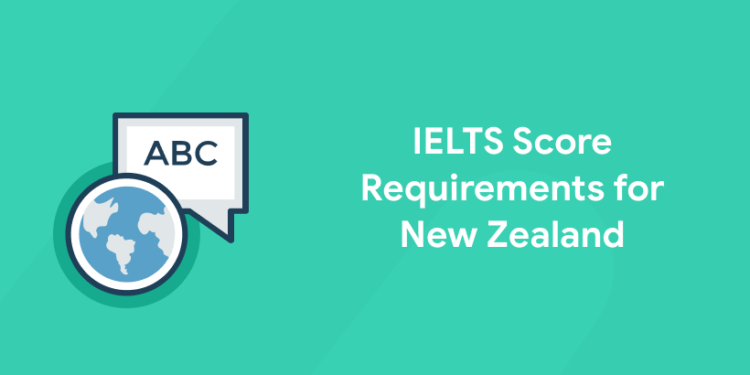Table of Contents
New Zealand is a wonderful country that boasts of safety and cleanliness. This makes it one of the popular destinations for immigration. One of the requirements for migration to New Zealand is a language proficiency test. The International English Language Testing System (IELTS) is required in New Zealand for a student or work visa. The requirements vary depending on the purpose of the visit. In this article, we throw light on IELTS score requirements for New Zealand.
Master the IELTS Exam with Online Coaching – Enroll Today!
Understanding IELTS Requirements for New Zealand
IELTS is accepted in all universities in New Zealand. It is required for getting admission into undergraduate, postgraduate, and research courses. IELTS is also a requirement for those planning to migrate to New Zealand.
There are two IELTS tests available: IELTS Academic and IELTS General Training. You have to choose the test based on what you want to do. If you are aiming to get into universities, you should go for IELTS Academic. General training is required for migration purposes.
If you want to get a student visa for the 2025 academic year in New Zealand, you need a minimum overall IELTS Band Score of 6 for UG and 6.5 for PG. For residence visas, you need a minimum score that ranges from an IELTS Band Score of 6.5.
What is the IELTS Score for New Zealand Student Visa?
1: Most university students ........................ on campus in their first year.
As mentioned earlier, for New Zealand you need a minimum of 6.0 for undergraduate and 6.5 for graduate courses.
| Program | IELTS Requirements |
| Diploma Programs | 6.0 (with no band less than 5.5) |
| Bachelor’s Degree | 6.0 (with no band less than 5.5) |
| Graduate Diploma | 6.0 (with no band less than 5.5) |
| Post-graduate Diploma | 6.5 (with no band less than 6.0) |
| Master Programs | 6.5 (with no band less than 6.0) |
The requirements may vary across the universities. Make it a point to check with the universities in New Zealand to know the exact requirements.
However, if you want to pursue a degree in engineering, teaching, or Education Studies, the minimum score required is 7.0 overall and per band.
Here is a university-specific table for easier understanding:
| University | UG IELTS Requirement | PG IELTS Requirement | Sectional Bands Requirement |
|---|---|---|---|
| University of Auckland | 6.0 (no band less than 5.5) | 6.5 (no band less than 6.0) | Reading, Writing, Listening, Speaking meet minimum |
| University of Otago | 6.0 (no band less than 6.0) | 6.5 (no band less than 6.0) | All bands must meet minimum |
| Victoria University of Wellington | 6.0 (no band less than 5.5) | 6.5 (no band less than 6.0) | Section minimum applies |
| University of Canterbury | 6.0 (no band less than 5.5) | 6.5 (no band less than 6.0) | Section minimum applies |
| Auckland University of Technology | 6.0 (no band less than 5.5) | 6.5 (no band less than 6.0) | All bands must meet requirement |
Always verify with your chosen institution; requirements can change per course.
In 2024, New Zealand welcomed over 73,000 international students—a record high—reflecting its rapidly growing reputation as a safe, high-quality study destination for Indian students.
Ace Your IELTS Exam with Confidence!
Unlock your potential with our expert-led IELTS preparation course. Achieve your dream score and open doors to global opportunities!
Start Your IELTS Journey Today!What is the IELTS Score for a New Zealand Work Visa?
People planning to move to New Zealand for work must meet the minimum IELTS requirement set by the New Zealand government.
- Applicants migrating under the skilled migrant category must score an overall band of at least 6.5 in the IELTS General or Academic module.
- The requirements for those under the business category depends upon the type of application one has applied for. Those relocating to New Zealand are required to score at least 5 in the IELTS exam.
- Entrepreneurs should have a minimum score of 4 and investors should score at least 3 in the General or Academic module.
- Applicants planning to move as a resident in work category should attain an overall band score of 5 in IELTS General or IELTS Academic module. The partners accompanying need an overall band of at least 5.
Factors Affecting Required IELTS Scores
The minimum IELTS score you need for New Zealand changes based on several important factors:
-
Purpose of Visit:
Your visa type (student, skilled worker, resident, entrepreneur, or investor) determines the minimum score you must attain. For instance, academic programs usually require higher scores (especially at postgraduate level), compared to some work or business migration categories. -
Level and Field of Study:
Undergraduate courses typically require an overall band of 6.0 with no component band below 5.5, while postgraduate, engineering, teaching, or education programs usually need a higher band—often 6.5 or 7.0 overall, with individual bands no less than 6.0 or 7.0. Specialized fields such as medicine or education may set stricter requirements to ensure advanced English proficiency for professional standards. -
University or Institution Requirements:
Each university or college in New Zealand sets its own minimum IELTS criteria, which can be higher than the visa requirement. Always confirm with your chosen institution, as some prestigious universities or competitive programs may demand above-minimum scores for admission. -
Visa Category:
-
Student Visa: Generally, the minimum is 6.0 for undergraduate and 6.5 for postgraduate courses, but select programs can require 7.0 or more.
-
Skilled Migrant Visa: A minimum overall band of 6.5 is required, with no component less than 6.0, to prove readiness for New Zealand’s professional environment.
-
Essential Skills or Temporary Work Visas: The minimum required score is usually 5.0 across all bands, making it more accessible for those entering in non-specialist roles.
-
Investor/Entrepreneur/Business Visas: The bar is lower for business migrants, often ranging from band 3.0 to 5.0, depending on the specific subcategory and role.
-
-
Permanent Residency (PR):
Applicants for PR under the skilled migrant or residence category must meet higher English requirements to show the capacity to integrate and communicate effectively in New Zealand society. -
Accompanying Family Members:
Spouses and dependent family members applying as partners often need to meet a basic English proficiency standard, typically an overall band score of 5.0. -
Recent Policy Changes:
Immigration policies are subject to periodic updates. Score thresholds can shift, so it’s essential to check the latest criteria on the official Immigration New Zealand website or with your target institution before applying.
IELTS Preparation Tips for New Zealand Applicants
-
Study with Official Materials:
Use British Council, IDP, and Cambridge IELTS books for practice. These resources closely match the actual test’s format and difficulty, ensuring you’re well prepared. -
Take Comprehensive Practice Tests:
Conduct full-length, timed mock exams to simulate test-day conditions. This will help you manage your time effectively in each section—Listening, Reading, Writing, and Speaking. -
Build a Structured Study Schedule:
Create a weekly timetable covering each skill area, allocating extra time to your weakest skills. Breaking your prep into daily tasks helps maintain consistency and reduce last-minute pressure. -
Join a Professional Coaching Program:
Consider enrolling in an online IELTS coaching program like Entri App for personalized feedback, guided practice, and targeted lesson plans. Experienced tutors can spot weaknesses you may not notice and help you correct them quickly. -
Practice Active Listening:
Improve your listening skills by regularly tuning in to English-language podcasts, news channels, and TED Talks. Focus on different accents—British, New Zealand, and Australian English are especially useful. -
Upgrade Vocabulary and Grammar:
Make it a habit to learn new words, idioms, and phrases daily. Use them in your speaking and writing practice, as vocabulary and grammatical range are critical for scoring higher. -
Enhance Speaking Fluency:
Record yourself answering IELTS speaking prompts. Practice with a partner or join a study group to mimic the interactive nature of the actual test. Emphasize clarity, coherence, and natural pronunciation. -
Develop Reading Strategies:
Practice skimming for gist and scanning for key details in articles, academic papers, and news stories. Learn to quickly identify the main idea, supporting information, and inferences. -
Get Feedback on Writing:
Share your essays and letters with teachers or online platforms for detailed feedback. Focus on structure (introduction, body, conclusion), task response, and coherence. -
Track Progress and Analyze Mistakes:
After each practice test, review your answers. Identify the types of mistakes you make most often and adjust your study plan to focus on those areas.
Ace Your IELTS Exam with Confidence!
Unlock your potential with our expert-led IELTS preparation course. Achieve your dream score and open doors to global opportunities!
Start Your IELTS Journey Today!Common IELTS Mistakes (and How to Avoid Them)
-
Ignoring Band Minimums:
Many candidates focus only on the overall score and forget that even a single sectional score below the university/visa minimum can disqualify them. Always target both overall and per-section requirements. -
Poor Time Management:
Candidates often run out of time, especially in Reading and Writing. Practice with a timer and learn to allocate your minutes for each task or question, aiming to finish slightly ahead of the clock. -
Overlooking Listening and Speaking Practice:
Some test-takers spend all their energy on reading and writing, neglecting listening and speaking. Engage in daily listening and try real conversations with fluent English speakers to build confidence. -
Not Understanding the Question:
In Writing and Speaking, failing to address the given prompt results in low task achievement scores. Always analyze the question and structure your response around what is specifically asked. -
Repetitive Vocabulary and Grammar:
Using only simple sentences and basic words caps your score. Work on expanding your vocabulary and use complex sentence structures appropriately. -
Neglecting Pronunciation:
In the Speaking section, unclear speech or strong native accents can affect marks. Record yourself, note problem sounds, and practice with pronunciation tools or apps. -
Failing to Proofread:
In Writing, spelling and grammar mistakes lower your marks. Save the final 2–3 minutes to quickly review and correct errors before submission. -
Over-relying on Free Online Material:
Not all resources are high-quality or up to date. Regularly supplement with reputable, official sample papers and guidance from certified trainers. -
Underestimating Test Day Logistics:
Arriving late, not bringing acceptable ID, or misunderstanding the venue’s instructions can create unnecessary stress. Plan your journey, double-check requirements, and arrive early on test day.
Conclusion
In order to move to New Zealand, you need to be able to hold a basic conversation in English. Your IELTS score is proof of your proficiency in the language. Entri App’s IELTS coaching has helped aspirants achieve their dreams by understanding their needs and providing required assistance.
| Related Links | |
| All About the IELTS Exam | IELTS Reading Practice Test |
| IELTS Listening Practice Test | IELTS Writing Practice Test |
| IELTS Speaking Practice Test | Vocabulary in IELTS |
Ace Your IELTS Exam with Confidence!
Unlock your potential with our expert-led IELTS preparation course. Achieve your dream score and open doors to global opportunities!
Start Your IELTS Journey Today!Frequently Asked Questions
Is IELTS mandatory for everyone moving to New Zealand?
Yes, IELTS is mandatory for everyone including students, employees, those planning to become permanent residents and entrepreneurs.
What is the IELTS score required for nurses in New Zealand?
The minimum IELTS score required for nurses in New Zealand is 7 in each section.
What is the IELTS score required for study visa in New Zealand?
The IELTS score required for study visa in New Zealand is 5.5.
Which universities accept an IELTS band below 6.0?
Some polytechnics and specialized private institutes may accept band scores as low as 5.5 for undergraduate diplomas, but most degree programs require at least 6.0. Always check the latest entry criteria.
Is IELTS the only English test accepted?
No. Most universities and Immigration New Zealand also accept TOEFL, PTE Academic, and Cambridge English. Always confirm with your chosen university.
What if I miss the minimum in one section?
Even if your overall band is sufficient, missing the minimum in a single section can result in a visa or admission denial. Re-taking the IELTS is recommended if you do not meet every band requirement.
How long is my IELTS score valid for?
IELTS scores are generally valid for two years from the date of your test, for both university admissions and visa purposes.













